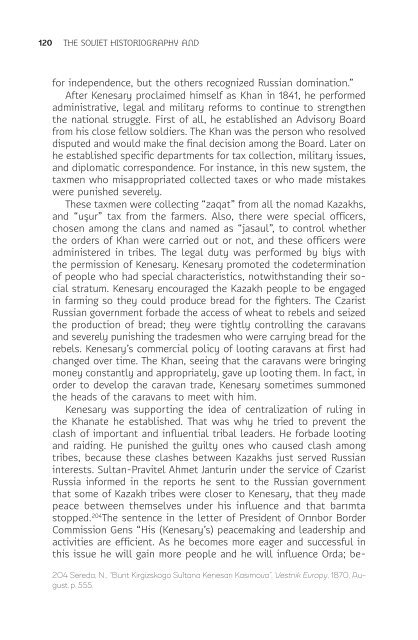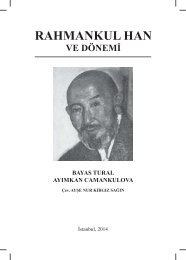THE SOVIET HISTORIOGRAPHY AND THE QUESTION OF KAZAKHSTAN’S HISTORY
SOVYET-TARIH-YAZICILIGI-ENG
SOVYET-TARIH-YAZICILIGI-ENG
You also want an ePaper? Increase the reach of your titles
YUMPU automatically turns print PDFs into web optimized ePapers that Google loves.
120<br />
<strong>THE</strong> <strong>SOVIET</strong> <strong>HISTORIOGRAPHY</strong> <strong>AND</strong><br />
for independence, but the others recognized Russian domination.”<br />
After Kenesary proclaimed himself as Khan in 1841, he performed<br />
administrative, legal and military reforms to continue to strengthen<br />
the national struggle. First of all, he established an Advisory Board<br />
from his close fellow soldiers. The Khan was the person who resolved<br />
disputed and would make the final decision among the Board. Later on<br />
he established specific departments for tax collection, military issues,<br />
and diplomatic correspondence. For instance, in this new system, the<br />
taxmen who misappropriated collected taxes or who made mistakes<br />
were punished severely.<br />
These taxmen were collecting “zaqat” from all the nomad Kazakhs,<br />
and “uşur” tax from the farmers. Also, there were special officers,<br />
chosen among the clans and named as “jasaul”, to control whether<br />
the orders of Khan were carried out or not, and these officers were<br />
administered in tribes. The legal duty was performed by biys with<br />
the permission of Kenesary. Kenesary promoted the codetermination<br />
of people who had special characteristics, notwithstanding their social<br />
stratum. Kenesary encouraged the Kazakh people to be engaged<br />
in farming so they could produce bread for the fighters. The Czarist<br />
Russian government forbade the access of wheat to rebels and seized<br />
the production of bread; they were tightly controlling the caravans<br />
and severely punishing the tradesmen who were carrying bread for the<br />
rebels. Kenesary’s commercial policy of looting caravans at first had<br />
changed over time. The Khan, seeing that the caravans were bringing<br />
money constantly and appropriately, gave up looting them. In fact, in<br />
order to develop the caravan trade, Kenesary sometimes summoned<br />
the heads of the caravans to meet with him.<br />
Kenesary was supporting the idea of centralization of ruling in<br />
the Khanate he established. That was why he tried to prevent the<br />
clash of important and influential tribal leaders. He forbade looting<br />
and raiding. He punished the guilty ones who caused clash among<br />
tribes, because these clashes between Kazakhs just served Russian<br />
interests. Sultan-Pravitel Ahmet Janturin under the service of Czarist<br />
Russia informed in the reports he sent to the Russian government<br />
that some of Kazakh tribes were closer to Kenesary, that they made<br />
peace between themselves under his influence and that barımta<br />
stopped. 204 The sentence in the letter of President of Orınbor Border<br />
Commission Gens “His (Kenesary’s) peacemaking and leadership and<br />
activities are efficient. As he becomes more eager and successful in<br />
this issue he will gain more people and he will influence Orda; be-<br />
204 Sereda, N., “Bunt Kirgizskogo Sultana Kenesarı Kasımova”, Vestnik Evropy, 1870, August,<br />
p. 555.



